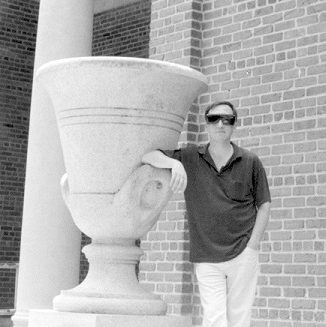By Scott Ross
A minor effort from a major filmmaker is still an event.
While Verboten! (1959) was the first of Samuel Fuller’s pictures as a writer-director to draw from his own war-time experience in a context specific to World War II — and despite its striking opening sequence of isolated American GIs and SS snipers battling it out in a small German town during the waning moments of the Second World War — the picture limns combat of a very different sort from the type on which Fuller would later concentrate his creative attention. Where Merrill’s Marauders and, most notably, The Big Red One, are concerned primarily with warfare (as are Fuller’s earlier The Steel Helmet and Fixed Bayonets!, both centered in Korea as opposed to the 1940s ground war in Europe) Fuller’s focus in Verboten! is the aftermath of war: specifically, the American occupying government’s efforts at de-Nazification of the populace and the equally fervent activities of a small underground band of former SS determined upon a rebirth of the Hitler creed. Within this context, Fuller also anatomizes fraternization between American soldiers and German citizens, focusing his narrative on the question of whether a marriage between two such people is one of, on the German side, convenience merely.

Helga (Susan Cumming) and Bruno (Tom Pittman), amused by how easy it is to fool their well-meaning American conquerors.
That’s a lot to cram into 93 minutes, but as is so often the case with Fuller, Verboten! somehow manages not to stint on any of its narrative particulars. Just as we think we have the measure of Helga Schiller (the refreshingly de-glamorized Susan Cummings) the filmmaker reveals that, while she is no Nazi, she is a staggeringly breezy opportunist, her cool persona wholly at odds with the warmth she projects for the benefit of Sergeant David Brent (James Best). The revelation — to the audience, not to Brent — is almost shocking in its nonchalance, as Helga goes from bidding Brent a passionate farewell to, moments later, greeting an old friend, the casual monster Bruno Eckhart (Tom Pittman) and offhandedly informing him (and the viewer) of her duplicity. It’s a moment perhaps only Sam Fuller could, or would, present: Un-pointed, with no histrionic embellishment whatsoever. In such ways is human cruelty carried out — without melodrama, over chocolate bars. (I wish I could say as much for the picture’s truly obnoxious Harry Sukman score, replete with godawful Paul Anka “theme song.”)

Brent (James Best) confronts a crowd of angry Germans.
The introduction of Brent into the story is notable too, not for what it leaves out but for what it shows; had movie audiences of that time ever seen an American soldier shot in the ass? It’s a moment typical of Fuller’s lack of reverence for the supposed nobility of soldiering, about which he harbored no illusions. Typical as well is the superb make-up job on Best after he’s been attacked and beaten by the locals: the swollen lump under his jaw and the way that injury affects his speech. Best is a good match for this character — a little cynical, a little earnest, wholly believable. (Fuller aficionados will remember the North Carolina-born actor as the mad Southern sharecropper in Shock Corridor convinced he is J.E.B. Stuart.)
What trips Fuller up, understandably, is the wrenching difference between the documentary footage he occasionally inserts into the picture and the loose but still more formal cinematography by the reliable Joseph Biroc. It isn’t simply that the clash of styles and film stock are jarring, but that a single moment, of an emaciated Jewish victim’s body being dumped into a mass grave, is, in its very brevity, more powerful and gut-churning than anything else in the picture. That it also represents a turning point in the attitudes of Helga’s angry young brother Franz (Harold Daye) feels rushed, and unconvincing. Can a single session watching the Nuremberg trials turn the mind of an embittered youth (one, moreover, who owes the loss of an arm to an American bomb), so quickly? Particularly one whose own sister is introduced in the movie denouncing Hitler and who, therefore, has heard the truth from very close up? It’s not an impossibility, but in context, it feels improbable.

Harold Daye as Franz.
All the more so because it is the scales falling from Franz’s eyes that lead to his betrayal of the Werewolf gang and the fiery conclusion of the picture. And here we must confront the weird incompleteness with which Fuller ends his story. The last moments are not so much ambiguous as utterly uncertain. Has Franz survived the flames? Do Brent’s ministrations save him? They seem to, but the action is cramped, and maddeningly inconclusive. It’s all too rushed, and attenuated; the scene — and the movie — cut off abruptly, as if Fuller had simply run out of film, leaving the viewer not troubled but bewildered. We don’t necessarily expect Sam Fuller to wrap all our troubles up in dreams for a sunny finale. In fact, that’s one of his strengths as a filmmaker. But we are accustomed to knowing where we stand.
Text copyright 2015 by Scott Ross

